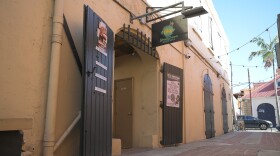ST. CROIX — Residents whose families have lived in LBJ Gardens for generations are demanding fair compensation as the Virgin Islands Housing Finance Authority prepares to make them offers to purchase their homes based on individual appraisals.
Residents living in the two-block area of LBJ Gardens shared memories of what was once a pristine neighborhood that is now located next to the VIHFA’s abandoned housing community the agency is in the process of demolishing.
“This was one of the most beautiful communities on St Croix,” Alejandro Torres III, a third-generation LBJ Gardens resident, said. “We had mango, we had mahogany trees, we had almond trees, we had a park.”
Mireya Bermudez, who lives with her husband in LBJ Gardens, said everything in the neighborhood has drastically changed.
“Just because the way it looks like it does, a lot of people don’t believe people are still living here,” she said, adding she does not understand why the government abandoned the nearby housing community. “Everything is deteriorating faster than expected.”
The surrounding area the VIHFA owns has become a dumping ground for garbage and abandoned vehicles in addition to a space for horse owners to tie up their animals, leaving manure to pile up.

As the Housing Finance Authority moves ahead with plans to demolish the former housing units, it has offered potential voluntary options to the LBJ Gardens residents.
“The options include a buyout, which requires collective community agreement and would require the properties to convert to green space, while the second option is an acquisition allowing VIHFA to purchase the properties without full community participation and would require future mitigation and possible redevelopment,” according to Nikya Kirnon, VIHFA director of communications.
Bermudez, who lives in the home she was raised in after her parents purchased it in 1967, said she and her husband are hoping the government offers them enough to purchase a new house since theirs is paid off.
“Nobody wants to move out if they have to pay a mortgage,” she said.
Torres, who lives with his mother in the house his great-grandmother purchased over 65 years ago, said he and his mother would not accept any offer from the government to sell their home unless they receive a fair price.
“If the price ain’t right, we ain’t moving,” he said.

Torres raised concern that the government would make a low offer, suggesting the abandoned housing community that surrounds his beachfront neighborhood brought down the property value.
“Now they want to come and offer us money that’s not enough to buy us a house,” Torres said. “And what about compensating us for all the stress and all the emotional damage, all the emotional distress that they have caused us, not only emotional distress but also the health hazards.”
Discussing the impact on the health of residents in the neighborhood, Torres noted that demolition work to tear down the abandoned housing community visible from his backyard began without any notice on January 31. He recalled dust blowing into his home, causing him and his mother to experience sore throats, shortness of breath, and watery eyes. He noted that the area is surrounded by abandoned vehicles, discarded garbage, and horses left tied up.
“They have us like a trash bin, like a dump, and it’s hazardous, man,” he said.
VIHFA officials held a meeting with the residents of LBJ Gardens on March 24 to address concerns related to housing safety following the recent demolition of the neighboring structures, the agency announced on March 27. In addition to exploring mitigation options, VIHFA has partnered with a company to conduct comprehensive water testing for the residents. The agency has temporarily paused its demolition project.

In addition to being located next to the abandoned housing community, Torres pointed out his neighborhood is next to the Virgin Islands Water and Power Authority’s power plant on the east side, and the Virgin Islands Waste Management Authority’s pump station on the north side. He said there is also a nearby boat-building company. Despite the industrial activity in the area, Torres said he thinks the government will appraise the homes based on residential zoning before making offers to purchase them.
“Why not just offer each resident one set of money for everybody so we can all buy a house and get out of here if you want the place so bad?” he asked.
Margarita Centeno, an LBJ Gardens resident of 58 years who lives in her home with her daughter, discussed a desire to leave the neighborhood to get away from the nearby power plant, noting the addition of propane extended plant operations closer to her neighborhood.
“We have to move because this is a dangerous place,” she said.
Centeno is optimistic the government will make her an offer she could use to purchase another house.
“If the government is going to pay for the house, then we can move, but we need the money to buy another house,” she said.
Senator Marise James, Committee on Disaster Recovery, Infrastructure and Planning chair, said she heard about a plan to demolish all the housing communities built along the coastline between downtown Christiansted and LBJ Gardens back in 1997 so the beachfront property could be developed. She agreed that residents who choose to sell their homes to the government must be properly compensated, noting the ongoing “environmental injustice.”
“If my house or plot in LBJ is going to eventually turn into prime real estate, then I think right now you need to give me a house that is going to be free and clear of any liens, any mortgages, any encumbrances,” James said, adding that any less of an offer would be destroying generational wealth.
James said she is hopeful VIHFA can find creative ways to compensate the residents, noting the agency caused hardship for the residents since it is demolishing the nearby structures. She said she would hate to think that 25 years from now the entire coastline becomes prime real estate after moving the residents into homes they must pay a mortgage to afford.
“I’m not saying that they shouldn’t be moved,” she said. “I need to make that clear they should, but I think we need to put them in neighborhoods where they’re safe, secure, and it’s beautiful, and we pay them for the hardship we’ve created on them for all these years.”

To ensure the government does not take advantage of the residents living in LBJ Gardens, Torres said he is seeking the services of an attorney to represent what he estimated were 15 to 20 families living in the neighborhood.
“It’s a small community but we’re very close because we all know each other,” he said. “We’ve lived here all our lives.”
James, an experienced real estate attorney, suggested the LBJ Gardens residents should get an attorney to guide them before completing any real estate transaction.
“I would advise the residents of LBJ to get a real estate attorney, or an attorney that they can sit down with and evaluate what the offer is that’s being given to them,” she said.
As the LBJ Gardens residents consider both options presented by VIHFA, they have until April 28 to formally submit their decisions to the Authority.
“It’s important to clarify that the April 28, 2025 deadline is only for residents to express their interest in writing to VIHFA on the options presented, not to make a final decision on the future of their personal properties,” according to Kirnon.















